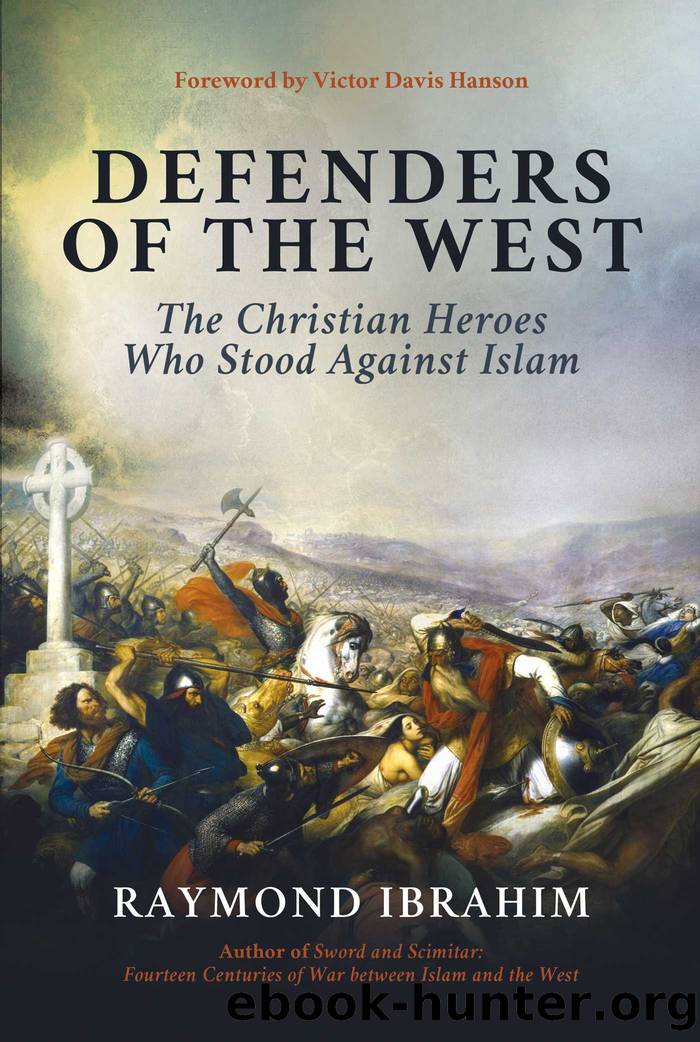Defenders of the West: The Christian Heroes Who Stood Against Islam by Ibrahim Raymond

Author:Ibrahim, Raymond [Ibrahim, Raymond]
Language: eng
Format: epub
Tags: History, Religion, Biography
ISBN: 9781642938210
Goodreads: 61034081
Publisher: Bombardier Books
Published: 2022-07-26T07:00:00+00:00
Chapter 6
John Hunyadi: The White Knight of Wallachia
âWe have had enough of our men enslaved, our women raped, wagons loaded with the severed heads of our people, the sale of chained captives, the mockery of our religionâ¦. [W]e shall not stop until we succeed in expelling the enemy from Europe.â
âJohn Hunyadi1
âTis John, called Hunyadi, who is to be the salvation of Christendom.â
âJohn Capistrano2
The final expulsion of the Crusaders from the Holy Land in 1291 coincided with the rise of a new Islamic powerâone that would require every ounce of Crusading zeal to be redirected from offensive warfare (trying to reconquer Jerusalem) to defensive warfare (trying to protect Europe).
In the late thirteenth century, a Turkish chieftain by the name of Osman (1258â1326) began laying the foundations of and eventually imparted his name to what would become the Ottoman (from Osman) Empire. After purging northwest Anatolia of its ancient Christian characterâsources speak of churches aflame and Christians massacred, enslaved, or fleeingâOsmanâs successors entered the easternmost strip of Europe and took the old fortress town of Gallipoli in 1354.3 There, âwhere there were bells,â an Ottoman chronicler wrote, Suleiman, a grandson of Osman âbroke them up and cast them into fires. Where there were churches he destroyed them or converted them to mosques. Thus, in place of bells there were now muezzins.â4 Cleansed of all Christian âfilth,â Gallipoli became the first jihadist base whence the terrorization of the Balkans began; or, as Mustafa, an Ottoman emir later boasted, Gallipoli became âthe Muslim throat that gulps down every Christian nation, that chokes and destroys the Christians.â5
Despite European resistance, by 1371 Thrace and large swathes of Bulgaria and Macedonia were overrun and devastated. Traveling through them later that same year, Issaye, a Mount Athos monk, recorded his impression: âThe Ishmaelites,â he wrote, conflating Turks with Arabsâboth Muslimsââmassacred one part of the Christians with the sword, and led off others into slavery; the rest were carried off by a premature death.â He described how natureâin the guise of a terrible famine and ravenous wolvesââdecimatedâ the rest: âAlas, what a sorrowful picture to behold! The land is left devoid of all goods, men, livestock, and other produce.â The devastation and desolation was so horrific that those who remained alive âtruly envied the dead,â concluded Issaye.6 (Such accounts underscore the fact that, as historian Dimitar Angelov writes, âthe conquest by the Turks had disastrous consequences for the Balkan peoples and for centuries trammeled their normal economic and social development.â7)
In an effort to drive their Islamic tormentors out, on June 15, 1389, a large coalition of ChristiansâSerbians, Albanians, Bosnians, Bulgarians, Greeks, Hungarians, and Wallachiansâfought but lost to the Turks at Kosovo. On September 25, 1396, an even larger coalition of Balkan Christiansâthis time augmented by Western, primarily French, forcesâtried again and lost again to the Turks at the battle of Nicopolis. A new wave of terror and slave raids ensued, as Ottoman suzerainty extended deeper into the Balkans.
The victor at Nicopolis, Bayezid I, one of Ottoman historyâs many depraved sultans, especially relished the human booty.
Download
This site does not store any files on its server. We only index and link to content provided by other sites. Please contact the content providers to delete copyright contents if any and email us, we'll remove relevant links or contents immediately.
| Hadith | History |
| Law | Mecca |
| Muhammed | Quran |
| Rituals & Practice | Shi'ism |
| Sufism | Sunnism |
| Theology | Women in Islam |
The History of Jihad: From Muhammad to ISIS by Spencer Robert(2620)
Nine Parts of Desire by Geraldine Brooks(2361)
The Turkish Psychedelic Explosion by Daniel Spicer(2354)
The First Muslim The Story of Muhammad by Lesley Hazleton(2268)
The Essential Rumi by Coleman Barks(2043)
1453 by Roger Crowley(2023)
The Last Mughal by William Dalrymple(1855)
Trickster Travels: A Sixteenth-Century Muslim Between Worlds by Davis Natalie Zemon(1847)
Muhammad: His Life Based on the Earliest Sources by Martin Lings(1644)
God by Aslan Reza(1639)
by Christianity & Islam(1627)
A Concise History of Sunnis and Shi'is by John McHugo(1567)
No God But God by Reza Aslan(1540)
Magic and Divination in Early Islam by Emilie Savage-Smith;(1533)
The Flight of the Intellectuals by Berman Paul(1501)
Nothing to Envy by Barbara Demick(1445)
Art of Betrayal by Gordon Corera(1429)
What the Qur'an Meant by Garry Wills(1391)
Getting Jesus Right: How Muslims Get Jesus and Islam Wrong by James A Beverley & Craig A Evans(1340)
